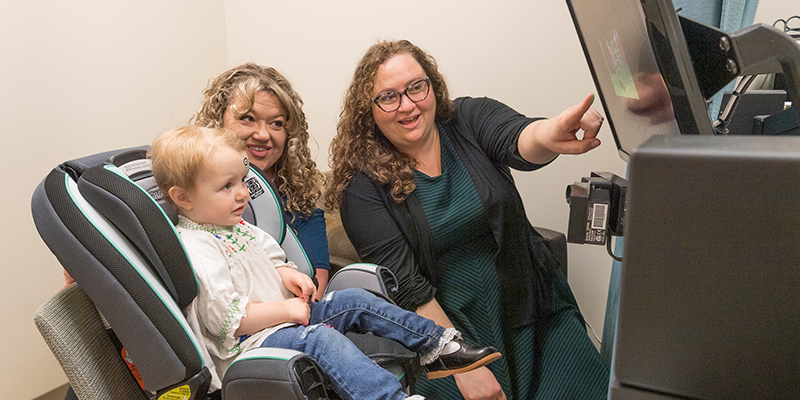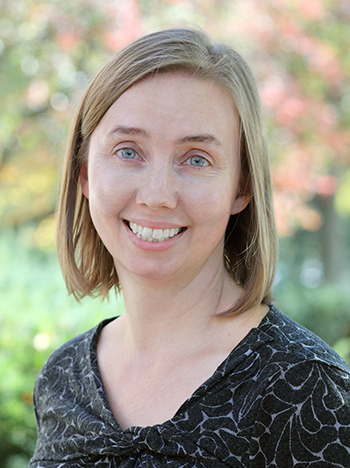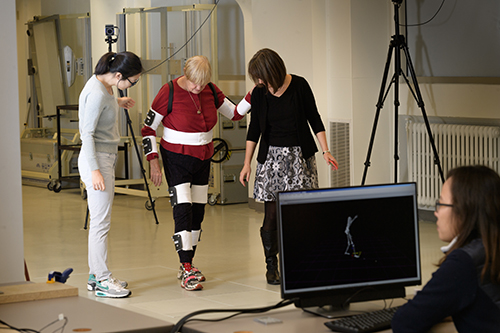Purdue College of Health and Human Sciences launches participant registry to elevate research
Written By: Rebecca Hoffa, rhoffa@purdue.edu

Arielle Borovsky (right) conducts research in her Language Learning and Meaning Acquisition (LLAMA) Lab.(Purdue University photo/John Underwood)
From developing interventions that improve health outcomes to exploring sustainable tourism practices, researchers in Purdue University’s College of Health and Human Sciences (HHS) study a wide range of topics that improve lives. These groundbreaking discoveries and life-changing interventions often rely on participants from the Greater Lafayette community and beyond to make the advancements possible.
The new Health and Human Sciences Research Registry, which is a Ripple Science database, aims to simplify the process for people who wish to contribute to HHS research as well as for the researchers who are looking for participants for their research studies.
As part of the college’s efforts to refresh its signature research areas, A.J. Schwichtenberg, associate professor in the Department of Human Development and Family Science, and Arielle Borovsky, associate professor in the Department of Speech, Language, and Hearing Sciences, with input from community members, faculty and leadership throughout the college, concepted database that would collect basic information from individuals interested in participating in research studies. With its launch in August, the research registry is now inviting community members to participate in HHS’ next giant leaps in research.
“We wanted something that will support the community long-term,” Schwichtenberg said. “Particularly in the area of developmental research, finding families and finding people is a constant need. In Health and Human Sciences, the one thing so many of us have in common is the human portion.”
Contributing to a greater good

A.J. Schwichtenberg
Schwichtenberg noted that often people sign up to participate in research studies with a common goal: to make a difference in science that helps people live happier, healthier lives. Participants include Purdue students, community members, alumni and other individuals who simply wish to make a difference. While there is no direct compensation from joining the registry, individuals who sign up for studies are often compensated or incentivized for their time and involvement.
Prior to the registry, labs would often send their own callouts to individuals and families, recruiting research participants through scattered communication efforts that overlapped with other labs on campus. Often, this caused confusion for community members who were contacted by more than one lab. The research registry combines the college’s resources to make collaborating with research labs easier and less repetitive for the community.
“My lab works with families that have young children, and there are several labs in the university that also do that, so a parent may be talking with various labs at the university, and it can be very easy to get confused,” Borovsky said. “(The registry is) going to make a much more streamlined experience for community members who want to be a part of research, which fosters trust and cultivates that excitement and good reputation for Purdue in the community, which is an important part of our mission.”
The Health and Human Sciences Research Registry is open to everyone in the continental United States interested in participating in research, with studies that appeal to people of all ages, from young children to older adults. With the growing number of remote studies, Schwichtenberg explained there are opportunities for everyone to make a difference.
Ultimately, joining the registry allows individuals to align their interests to specific research studies. In a simple questionnaire that takes less than three minutes to sign up, individuals can express their interest in specific research areas and provide as little or as much information about themselves as they’d like.
Those looking to participate in research also can choose a time commitment that works for them. Current studies looking for participants range from long-term studies, such as one looking at the health effects of grain foods in adults that spans 14 weeks, to short-term studies, such as a one-session study looking at neurodegenerative diseases and genetic and environmental risk factors.
“For people who want to participate more, this is going to make it easier for them to have a one-stop shop to connect with all kinds of studies,” Borovsky said. “You don’t have to do as much legwork if you are interested in being a part of research at Purdue. You contact this one place, and you can get connected to the studies that would be the best fit for you.”
Those interested in signing up can visit purdue.link/rr to register.
Transforming the research process

Research studies span the entire life span, and participants can select interests in a wide range of research topics.
While the registry’s design makes research involvement simpler for participants across the country, the registry also carries benefits for HHS researchers. The platform offers free access to track and pull participants into their studies — saving labs thousands of dollars in costs.
“Ultimately, all research scientists in the College of Health and Human Sciences have free access to the Ripple Science platform,” Schwichtenberg said. “This is really a value, and the college has invested in it.”
Borovsky elaborated that the platform will also make HHS researchers more visible in the research landscape and more competitive to receive research funding in having populations readily available for studies.
“Right now, the process of finding people to enroll in your study can take quite a long time,” Borovsky said. “I had a recent study where we enrolled 160 families with 18-month-old children. It took us a year and half to find enough the families to be part of the study. It will be such an amazing dream come true to be able to say, ‘I would like to do a study that would involve this number of families.’ I could call up the research registry, and it could say ‘Great — we’ve got you.’ This would make it possible for us to do our research more efficiently while being sure that we’re working with families who are engaged and excited already about participating in our research.”
Discover more from News | College of Health and Human Sciences
Subscribe to get the latest posts sent to your email.